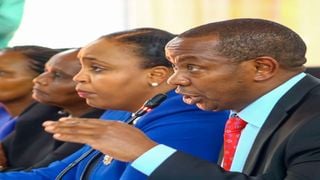
Former Laikipia governor Ndiritu Muriithi (right) presents a memorandum by the Azimio la Umoja One Kenya Coalition Party before the National Dialogue Committee at the Bomas of Kenya in Nairobi on Tuesday, October 3.
| Wilfred Nyangaresi | Nation Media GroupPolitics
Premium
Raila’s Azimio: Why we don’t trust Ruto to preside over law reforms
What you need to know:
- Raila’s team cites Ruto’s history of opposing constitutional changes as reason for doubt.
- President Ruto’s Kenya Kwanza has rejected calls for referendum, preferring a parliamentary process.
The Azimio la Umoja One Kenya Coalition Party has stirred fresh controversy by saying it can’t trust President William Ruto to midwife constitutional change.
The Opposition outfit that is led by Orange Democratic Movement (ODM) supremo Raila Odinga claimed President Ruto has a history of opposing constitutional reforms and it is unlikely that he would support a referendum to implement the proposals that have been made to the National Dialogue Committee (NDC).
The Opposition has raised concerns about President Ruto's intentions in the ongoing clamour for radical changes to the supreme law, which include altering the structure of Parliament and the executive by introducing the offices of Official Leader of Opposition and Prime Cabinet Secretary.
Also Read: Kalonzo - We now recognise Ruto as president
Dr Ruto successfully opposed constitutional amendments in 2005 alongside Mr Odinga. He then unsuccessfully opposed the current constitution in 2010, which was supported by Mr Odinga and then President Mwai Kibaki.
Dr Ruto also opposed the stillborn Building Bridges Initiative (BBI) that was spearheaded by Mr Odinga and former President Uhuru Kenyatta.
The latest hurdles emerged on a day when President Ruto’s Kenya Kwanza Alliance threw a spanner in the works by rejecting any plans for a referendum.
Kenya Kwanza said yesterday that the proposed changes would be implemented through a parliamentary initiative, even as Azimio insisted on a referendum as some of the changes touch on Article 255 of the Constitution.
“Our position as Kenya Kwanza is that any proposed amendments should be handled by Parliament because the country [has no money for] a referendum,” said United Democratic Alliance (UDA) secretary-general Cleophas Malala.
Also Read: President Ruto - Smart or reckless?
Addressing the 10-member NDC on Tuesday, Azimio politicians said Dr Ruto's intentions appeared mischievous.
“Azimio's position on these issues is well known, but it has concerns about Kenya Kwanza's intentions and cannot trust its leadership to midwife successful constitutional changes," the Opposition memorandum said.
Former Laikipia governor Ndiritu Muriithi, who presented the memorandum, said Kenya Kwanza should “convince the people that this time things are different and they have embraced the Constitution”. He said it was mischievous for Dr Ruto to seek radical constitutional changes through a parliamentary initiative.
Jubilee secretary-general Jeremiah Kioni claimed there was a plot to use a “compromised” parliament to push through changes favourable to the current regime.
“We will not allow a referendum question to be put through a parliamentary initiative. They are not genuine," he said.
A proposal to increase the number of counties, extend the presidential term and create the post of official opposition leader are some of the proposals that would require a referendum.
Also Read: Inside Ruto, Raila crisis talks drama
Constitutional lawyer Bob Mkangi said the creation of the office of the Official Leader of the Opposition goes beyond the mere insertion of the office into the Constitution, as it will affect the overall structure of Parliament and the executive, and must therefore be subjected to a referendum under Section 225 of the Constitution.
"It touches on the sovereignty of Kenyans and affects the functioning of Parliament. These are two of the 10 areas that Article 225 of the Constitution requires to be determined by a referendum," said Mr Mkangi.





